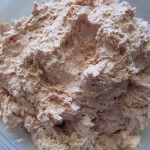 Innards. Entrails. Animal parts. If you’ve made a face at all three words, you’re not alone. Most people have an aversion to organ meats; however, if you knew just how nutritious they were for you, you’d eat them several times a week. In this post, I am going to focus on liver and its many benefits for you before and during pregnancy.
Innards. Entrails. Animal parts. If you’ve made a face at all three words, you’re not alone. Most people have an aversion to organ meats; however, if you knew just how nutritious they were for you, you’d eat them several times a week. In this post, I am going to focus on liver and its many benefits for you before and during pregnancy.
Liver is part of the offal family. The word offal refers to the organs within an animal. The term comes from the phrase “off fall”, which is the meat that has fallen off during butchering.
Thankfully, offal is starting to gain popularity, through its resurgence in the culinary world. Cable TV shows, like Food Network, feature chefs that cook up organ meats as a part of fine cuisine. Chef Michael Symon, a Cleveland based chef, even sports an “I Love Offal” t-shirt on occasion. Offal may be an up-and-coming trend, but the truth is that eating organ meats, namely liver, is something that people have been doing for centuries.
Liver: Nature’s multi-vitamin
Before I begin to discuss the nutritional benefits, let me first state that any liver that you purchase should be from hormone-free pastured animals (pastured is another name for grass fed). The quality of this meat is safe and nutrient dense, and with the correct ratio of Omega 3 to Omega 6 fatty acids.
Liver is very high in B vitamins, especially B12 and folic acid. B vitamins promote a healthy nervous system, sound sleep, mental sharpness and healthy energy levels. They also help to keep depression at bay. Folic acid is a B vitamin essential to good health, especially during pregnancy. It’s needed to prevent neural tube defects in babies, such as spina bifida, an incomplete closure of the spinal cord and spinal column. Studies have proven that women getting at least 400mcg of folic acid per day, prior to conception, reduce the chance of neural tube defects by as much as 70 percent.
Liver is not just rich in B vitamins. Along with egg yolks, raw milk and raw butter, liver is an excellent source of vitamin A. Proper vitamin A levels are needed for healthy eyes and skin, healthy bones and teeth, sex organ development and a healthy reproductive system.
Vitamin A works with vitamin K2, present in pastured dairy, for added bone health. For added nutritional support, serve liver with a pat of pastured butter for better absorption.
A higher intake of vitamin A is essential during pregnancy, despite the conventional belief that high amounts of vitamin A cause birth defects. Most of this flawed conventional view is based on a 1995 paper written by Dr. Kenneth Rothman of Boston University. This paper showed that consuming more than 10,000 IU of vitamin A per day significantly increased the chances of birth defects. The major flaw with this study was that the vitamin A in question was synthetic and the “foods” mentioned in the study were most likely fortified with synthetic vitamin A.
Pregnant women have been eating foods naturally high in vitamin A for centuries with no ill effects, long before the FDA existed. Rather than relying on a prenatal, get your vitamins the natural way through nutrient dense foods and quality supplements like fermented cod liver oil or butter oil.
Iron, like vitamin A, should be part of every pregnant woman’s vitamin arsenal, and liver is one of the best bio-available sources out there. Iron keeps you healthy by transferring oxygen to your blood. It assists in proper fetal brain development and is critical for a healthy immune system. If you are anemic and are thinking about having a child, rather than investing in iron supplements or fortified foods, you should invest in a plentiful source of pastured liver.
Liver contains an unnamed anti-fatigue factor that makes it an amazing food for everyone, especially expectant mothers. Benjamin K. Ershoff, PhD, referenced this factor in a 1951 article published in the Proceedings for the Society for Experimental Biology and Medicine. Pregnancy taxes a woman’s energy, so be sure to eat liver at least two to three times per week for an added energy boost, in addition to its other wonderful nutrients.
Liver for Dinner
Many of you may still shudder at childhood memories of choking down tough, rubbery liver, followed by chants of “It’s good for you.” The truth is when liver is properly prepared, it’s as delicious as it is nutritious. Liver and its vitamins are very heat sensitive, so overcooking is a definite no no. Always cook your liver rare or medium rare to preserve the nutrients. Not only is it better for you, but it’s tastier. Soaking liver in lemon juice or milk helps to remove that characteristic liver taste that makes people cringe.
Still can’t stomach the taste of liver? You can easily sneak this into your meals by adding it to ground meat, such as chili, or making a pate with fresh herbs. Grass fed natural liverwurst is also a tasty alternative. Make your own liverwurst spread! (See recipe at the end of this article.) For an even more potent option, freeze small pieces of liver and add a pea-sized amount to a vegetable-based capsule, and voila; you have your own liver supplement.
Mother Nature provides a nutritional powerhouse in liver. Expectant mothers have been indulging in this superfood for centuries. You owe it to yourself and to your child to add this food to your pre-conception and pregnancy regimen.
Liverwurst Spread
Ingredients:
8 ounces grassfed liverwurst
1/4 teaspoon dry mustard
8 ounces full fat cream cheese, room temperature
1/4 cup full fat sour cream (preferably raw)
2 cloves garlic, minced
Fresh thyme and sage
2 pastured hard boiled eggs, chopped
1 tsp coarsely ground black pepper or to taste
½ tsp of Celtic or unrefined sea salt or to taste
1/3 cup chopped kalamata olives
Directions:
Place liverwurst and dry mustard in food processor; process until smooth.
Add cream cheese, sour cream, garlic and hard boiled eggs; mix until well combined.
Fold in the black pepper, thyme, sage, salt, kalamata olives with a spatula.
Chill spread for at least one day to let the flavors blend. It’s best to make the spread at least a day in advance.
Use this as a tasty dip for raw veggies.
Article by Taheerah Barney












